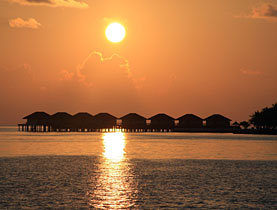
Tourism industry braced for hard year ahead

Swine flu and the economic crisis have made this a tough year for leading Swiss holiday companies – and they do not expect 2010 to be much better.
Swiss travel group Kuoni’s half-year turnover figures, released on Thursday, were 21 per cent down on the same period last year at SFr1.76 billion ($1.65 billion).
Its net loss was SFr51 million, compared with a 26.5 million half year profit in 2008.
The travel group, which is among Europe’s top five, said that the results had been “dramatically affected by a number of external influences” such as the economic crisis, swine flu and significantly adverse currency rates.
It added that booking trends for the second half of 2009 suggested a slight improvement in customer demand.
Although rival M-Travel, a subsidiary of the Federation of Migros Cooperatives, has not released any figures, it did say earlier this month that it did not necessarily expect to make a profit this year.
“This year has undoubtedly been the most difficult year since I have been working in tourism,” said Thomas Stirnimann, CEO of M-Travel, of his 30-year experience in the field.
Troubles
“The reason for this is that we are seeing ‘troubles’ over all destinations and segments,” he told swissinfo.ch.
“So it’s not just budget travellers who are affected, it is also premium travellers. It is not just one single destination that is lacking in demand, it is almost every destination. This makes the crisis more severe than any other before.”
Swine flu affected summer traffic to Mexico. Classic destinations like Spain and Italy have also suffered from the downturn, said Stirnimann. But the United States has benefited from a strong Swiss franc.
M-Travel has seen an increase in people going for “all-inclusive” deals in Tunisia and Egypt.
Kuoni’s Swiss branch has also noticed some changes. “We saw that much later decision-making took place and that people tended to go to places that are known,” Stefan Leser, Kuoni Switzerland’s CEO told swissinfo.ch in an earlier interview.
“There’s a very clear trend of a short-haul preference versus long-haul travel.”
2010 outlook
Swine flu aside, Leser expects 2010 will see “a slight recovery but I can’t predict how much that will be”.
For Stirnimann, it will be “no rose garden”.
“We anticipate another difficult year for tourism in general,” he said.
The firms have thus been shaking up their winter programmes. Kuoni Switzerland has abolished price lists at Helvetic Tours, its beach holiday firm, in what is a Swiss travel industry premier.
There is now fluid pricing, achieved daily by looking at factors such as demand, aeroplane capacity and the weather.
At M-Travel winter season prices are five to ten per cent down on last year.
Thomas Bieger, a professor at the Institute for Public Services and Tourism at St Gallen University, said short notice bookings made it difficult for tour operators to forecast demand and manage capacities. This leads to the development of more flexible booking and pricing systems, he said.
Flexible pricing
Kuoni’s decision is the start of a general trend, he believes, already seen in the airline and rail industries.
“We’ll see a kind of transition period until customers will have learned and adapted to this new regime and during this time we will have both systems, so some tour operators will stick to the published prices and others will make the step and be the first movers in introducing more flexible pricing systems,” he told swissinfo.ch.
Overall, he sees a differentiated outlook for 2010. He predicts that in some Asian and English-speaking countries, the economy should recover so people will invest in intercontinental travel, especially in the second half of the year.
But European countries in particular will continue to feel the downturn in their holiday markets and in outbound long haul, sightseeing travel.
“Kuoni is not in a bad situation because it has quite good inbound travel, they have their strong position in many Asian countries besides their tour operating business in Switzerland, so for at least part of their business there will be a better prospect next year,” Bieger said.
M-Travel, made up of eight companies ranging from budget to luxury, might be in a more difficult position because it relies mainly on the domestic market.
“In 2010 we will not be back to the routine of strong, growing markets,” Bieger said. “There will still be a difficult economic situation, as the real economy lags behind the financial developments.”
Isobel Leybold-Johnson, swissinfo.ch
Hotelplan Switzerland and Travelhouse have been operating under the joint name of M-Travel Switzerland since January 2008. Based in Zurich, it has 1,500 employees and 115 travel agencies in Switzerland. The Hotelplan Group has interests in other countries, such as Italy and Britain.
The Kuoni Group is one of Europe’s leading leisure travel companies (in the top 5), and has a worldwide workforce of 9,797 employees. Its headquarters are in Zurich, where Alfred Kuoni founded the company in 1906.
In Switzerland, where it is the largest operator, it has more than 100 travel agencies, five franchise partners and its products are sold in 900 other outlets. It employs around 1,500 people. Around 20 per cent of its turnover is generated in Switzerland, according to the Swiss Federation of Travel Agencies.
Both the Kuoni Group and M-Travel have undergone restructuring and layoffs in 2009.
Another important player on the Swiss market is TUI(Suisse). TUI and its budget brand 1-2-Fly have reduced prices by 6 per cent in the winter season due to a fixed exchange rate of SFr1.49 per Euro. It has also increased the number of all inclusive hotels to 45 per cent.
According to the Federal Statistics Office, the Swiss spent around SFr11.8 billion on travel abroad in 2008, a drop of 2.3% on the previous year. This was mostly due to trips with overnight stays decreasing by 3%, said the office.
Although the Swiss could benefit from a strong franc, the number of overnight stays stagnated in the big markets.
Germany, Spain and the United States all counted more guests, but this was balanced out by fewer stays in Austria, France, Italy and Britain.

In compliance with the JTI standards
More: SWI swissinfo.ch certified by the Journalism Trust Initiative








































You can find an overview of ongoing debates with our journalists here . Please join us!
If you want to start a conversation about a topic raised in this article or want to report factual errors, email us at english@swissinfo.ch.